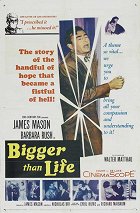Regie:
Nicholas RayKamera:
Joseph MacDonaldMusik:
David RaksinBesetzung:
James Mason, Barbara Rush, Walter Matthau, Robert F. Simon, Christopher Olsen, Roland Winters, Rusty Lane, Natalie Masters, Richard Collier (mehr)Inhalte(1)
When a friendly, successful suburban teacher and father (James Mason, in one of his most indelible roles) is prescribed cortisone for a painful, possibly fatal affliction, he grows dangerously addicted to the experimental drug, resulting in his transformation into a psychotic and ultimately violent household despot. (Verleiher-Text)
Kritiken (3)
It can be done without violence, without blood, and yet you have a man in the lead role who is incredibly terrifying. James Mason has proven several times how great of an actor he is, which also applies to the film "Bigger Than Life". No, he cannot be blamed for what happened to him, it's the medicine's fault, but it adds another layer to the whole story. When you watch Mr. Avery, you will be truly horrified by his behavior. An acting treasure with great built-up tension, aided by excellent use of shadows and expressions. It's no wonder the film is considered expressionistic.
()
Yes, exceptional films of the past should be approached with respect and consideration for the era in which they were made. However, even with the best intentions, in my view, Bigger Than Life does not come off as exceptional, but rather as a very average melodrama with all the vices that this genre and the conditions in the large American studios of the 1950s brought with them. The theme is interesting, but the film is made very conventionally, with a predictable ending and unremarkable acting performances. A minor curiosity for me was Walter Matthau from a time when he had not yet been made a star by American studios, but rather cast in a suitable acting type placed in a certain category. Drugs and dependency on them were portrayed much better and more realistically in later decades in American and world cinema. This film has the primacy of being one of the first, but that's too little for me to give it a higher rating. Overall impression: 40%.
()
The key melodramatic moment of the late awakening happens in Bigger than Life shortly after the beginning, which makes it possible for the film to continue with slowly rising psychological terror. Ed’s collapse is brought on by the empty routine of family life. As the opening shot reveals, he is running out of time. Only when he comes face to face with death does he see beyond the previously tacitly respected middle-class values that are starting to turn against him. He knows the truth, but he cannot escape and he doesn’t have the strength to fight. He suddenly fails as a father and husband, and as a man. Ray’s directing is very European in the care dedicated to the mis-en-scéne. Ed’s mental instability is mirrored (literally, in one scene) by the objects around him. His infallible authority, identified with the authority of God, looms over the son like a terrifying shadow. For a colour film shot in the widescreen CinemaScope format, Bigger than Life is unusually intimate and unusually bleak, and so conscientious in its etching of the myth of the happy American family that not even its final minutes can alter the overall impression that it makes. 80%
()
Galerie (16)
Photo © 20th Century Fox


Werbung